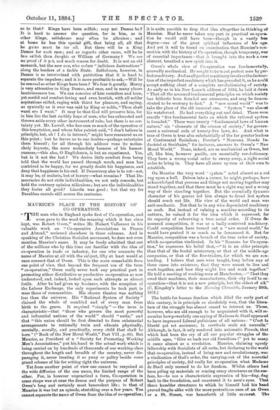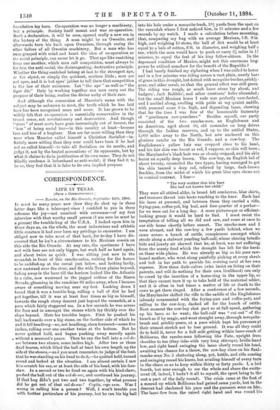MAURICE'S PLACE IN THE HISTORY OF CO-OPERATION.
• MHE man who in England spoke first of Co-operation, and
-1 even gave to the word the meaning which it has since kept, was Robert Owen," writes Mr. Hubert Valleroux in his valuable work on "Co-operative Associations in France and Abroad," reviewed elsewhere in these columns. And in speaking of the Christian Socialist movement, he does not even mention Maurice's name. It may be freely admitted that out of the millions who by this time are familiar with the idea of co-operation in trade or industry, for one who connects the name of Maurice at all with the subject, fifty at least would at once connect that of Owen. This is the more remarkable from one point of view, that beyond the frequent use of the term "co-operation," Owen really never took any practical part in promoting either distributive or productive co-operation as now understood, and, indeed, looked upon such attempts as almost futile. After he had given up business, with the exception of the Labour Exchange, the only experiments he took part in were those of communities. His chosen theatre was nothing less than the universe. His "Rational System of Society"
• claimed the whole of mankind and of every man from birth to the grave. It required " simply " — the term is characteristic—that "those who govern the most powerful and influential nations of the world" should "unite," and that "this union should be first directed to form substantial arrangements to rationally train and educate physically, mentally, -morally, and practically, every child that shall be born " (" Book of the New Moral World," Part VII., p. 68). But Maurice, as President of a "Society for Promoting Working Men's Associations," put his, hand to the actual work which is being carried on by hundreds of thousands of our working-class throughout the length and breadth of the country, never dis- paraging it, never treating it as puny or paltry beside some grand scheme of his for setting right the universe.
Yet from another point of view one cannot be surprised at the wide diffusion of the one name, the limited range of the other. For, in however unpractical a form, Co-operation in some shape was at once the dream and the purpose of Robert Owen's long and certainly most benevolent life ; in that of Maurice it was but an episode, stretching over a few years. You cannot separate the name of Owen from the idea of co-operation; it is quite passible to drop that idea altogether in thinking of Maurice. Had he never taken any part in practical co-operas tion he would still have been—though in a vastly bass degree—one of the great spiritual influences of his age. And yet it will be found on examination that Manrice's con- nection with the history of Co-operation, though temporary, was of essential importance—that it brought into the work a new element, breathed a new spirit into it.
Oweres whole view of Co-operation was fundamentally, avowedly mechanical. He sought to tusn out perfect men by per' feet machinery. And as all perfect machinery involves the destruc- tion of the imperfect machinery which has preceded it, so he eould.
accept nothing short of a complete revolutionising of society.
As early as in his New Lanark address of 1816, he laid it down "That all the assumed fundamental principles on which society has hitherto been founded are erroneous, and may be demons
strated to be contrary to fact" A "new moral world" was to- take the place of the old immoral one. " System " was almoat
his watchWord. He had everything cut and dried. There were exactly "five fundamental facts on which the rational system is founded." There were twenty "fundamental laws of human nature," six "elements of the science of society," for govern- - ment a universal code of twenty-five laws, &c. And what is true of Owen is true also substantially of the far greater leaders of Continental Socialism ; Fourier's "Nouveau Monde In- dustriel et Societaire," for instance, answers to "Now Moral World." None, indeed, are so mechanical as Owen, but all, like him, however pacific, are essentially revolutionary. They have a wrong social order to sweep away, a right social order to bring in. They have all some system of their own. to establish.
On Maurice the very word " system " acted almost as a red rag upon a bull. Driven into a corner, he might, perhaps, have-
acknowledged that persons and things not moving together may stand together, and that there must be a right way and a wrong way of their standing together. But the essentially dynamic character of his genius led him always to dread lest system should crush out life. His view of the world and man was anti-mechanic. Not that he in any wise depreciated machinery as such. But instead of valuing a machine according to its outturn, he valued it for the idea which it expressed, for its capacity of subserving a true social order. If Owen de- nounced competition, it was as a badly-contrived machinery. Could competition have turned out a "new moral world," he would have praised it as much as he denounced it. But for Maurice, competition was a breach of the true order of society, which co-operation vindicated. In his "Reasons for Co-opera- tion," he expresses his belief that,—" It is an older principle than that of the feudal aristocracy, or that of the middle-age companies, or that of the free-traders, for which we are con- tending. I believe that men were taught, long before any of these came into existence, that they were meant to live and work together, and how they might live and work together."
He told a meeting of working-men at Manchester,—" That they owed their machines, their manufactures, their city itself to co- operation—that it is not a new principle, but the oldest of alk" (C. Kingsley's letter to the Morning Chronicle, January 28th, 1851.)
The battle for human freedom which filled the early part of this century, is in principle so absolutely won, that the litera-
ture of the struggle has almost ceased to interest us. Those, however, who are old enough to be acquainted with it, will re- member howpowerfully one saying of Madame de Stool appeared
to have impressed Liberal politicians of all nations : " C'esti Is
liberte qui eat ancienne; la servitude seule eat nouvelle." Although, in fact, it only rendered into axiomatic French, that which had been the cry of all our popular struggles of the middle ages, "Give us back our old franchises 1" yet to many it came almost as a revelation. Maurice, claiming openly fellowship with Socialists of all sorts, but declaring to the world that co-operation, instead of being new and revolutionary, was a vindication of God's order, the carrying-out of the essential principles of society, did really for co-operation what Madame
de Steel only seemed to do for freedom. Whilst others had been piling up materials or rearing crazy structures on theses- face, he—to use a characteristic expression of his—dog, dog
back to the foundation, and uncovered it to men's eyes. That those humbler structures to which he himself lai4 his hand proved fragile alike with the more pretentious ones of an Owen or a St. Simon, was henceforth of little moment. The
foundation lay bare. Co-operation was no longer a machinery, but a principle. Society itself meant and was co-operation. Such a deolaration, it will be seen, opened really a new era in the history of the thing. A man might be an Owenite, and afterwards turn his back upon Owenism, through seeing the litter failure of all Owenite machinery. But a man who has once grasped with mind and heart the idea of co-operation as the social principle, can never let it go. That ape-like snatching from one another, which men call competition, must always be for him the anti-social, the disintegrating, destructive principle. Whether the thing snatched belong at last to the strongest ape, or the slyest, or simply the quickest, matters little ; men are not apes, and it is but apes' jabber to tell them that competition is the law of their existence. Let "the ape" as well as "the tiger die." Only by working together can men carry out the purpose of their being, realise the divine unity of their race.
And although the connection of Maurice's name with the subject may be unknown to most, the truth which he has laid bare has been recognised more and more. It has grown to be widely felt that co-operation is essentially conservalive in the truest sense, not revolutionary and destructive. And though " isms " of most sorts have gone increasingly out of favour, the "ism" of being social has—in this country at least—become less and less of a bugbear. Men are far more willing than they were when Maurice called himself a Christian Socialist—in- finitely more willing than they ever could have been if he had not so called himself—to take all Socialism on its merits, and judge it, not by the heated accusations of its opponents, but by what it claims to do in justification of its own name. They do not blindly condemn it beforehand as anti-social; if they find it to be so, they feel that it is false to its own implied purpose.



































 Previous page
Previous page